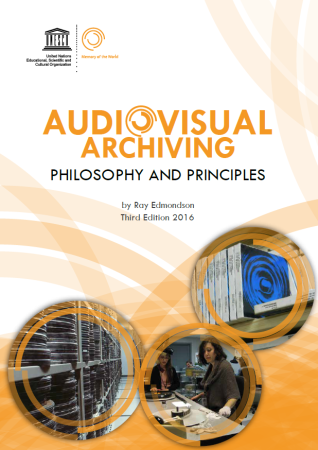ACTIONS
- Protect and safeguard cultural and natural heritage
- Learning and educational opportunities
- Cultural participation/social inclusion
- Sustainable tourism
- Support research
- Employment (recruiting, training, safety)
- Energy consumption, greenhouse gas emissions
- Waste management and reduction
- Transport (forms of, energy use)
- Commercial activities including copyright and IP
- Governance and management
- Security, disaster preparedness, risk reduction
- External partnerships and collaborations
- Toolkit/framework/roadmap
Audiovisual Archiving - Philosophy and Principles

Intended Audience
Professionals working in the audiovisual archiving field
- R. Edmondson, UNESCO Office Bangkok and Regional Bureau for Education in Asia and the Pacific
“Audiovisual heritage comprises a large part of our cultural legacy. The primary records of 20th and 21st Century cultures from around the world are captured in its myriad forms – from films and radio and television programmes to audio and video recordings. Sounds and images can transcend local borders and language barriers, making this heritage an essential complement to traditional archives and documents. The immediacy and immersion offered by audiovisual materials also make them indispensable in the teaching of history. It is for these reasons that the safeguarding and preservation audiovisual heritage is of vital importance.” (p.vii)
Avaiable in
- Burmese
- Chinese
- English
- Japanese
- Persian
- Portuguese
- Spanish
- Thai
SDGs LINKAGES
This resource helps users achieve SDG targets 9.1 (equitable access to collection facilities for all), 9.C (increase access to information for all), 11.4 (safeguard heritage through digitization) and 16.10 (ensure public access to information).
Click on the SDG Target to discover Our Collections Matter indicators
-
Our Collections Matter indicators:
- Development of research-useful collections to support reliable, sustainable and resilient use by researchers and others.
- Number and proportion of collections facilities and stores that support economic development and human well-being.
- Number and proportion of collections facilities and stores that provide affordable and equitable access for all.
- Investment in collections facilities.
- Inclusion of collections information in regional and transborder initiatives, notably via digital access for discoverability.
-
Our Collections Matter indicators:
- Number of collections facilities that provide access to ICT.
- Number of collections facilities that use digital programmes to connect people with heritage and sustainable development agendas.
- Number of programmes that support access to the Internet in least developed countries.
-
Our Collections Matter indicators:
- Total expenditure (public and private) per capita spent on the preservation, protection and conservation of all cultural and natural heritage, by type of heritage.
- Plans, policies and procedures in place for the safe use of collections for a variety of purposes, protecting and safeguarding both collections and those who use them.
- Plans, policies and procedures in place for the identification, safeguarding and protection of cultural and natural heritage at risk.
- Collecting programmes in place to protect, safeguard and make use of cultural and natural heritage, addressing the needs of communities and stakeholders, and ensuring that collections can be an effective resource for sustainable development.
- Number and diversity of educational, awareness-raising, research programmes, and partnerships that aim to strengthen protection of cultural and natural heritage.
-
Our Collections Matter indicators:
- Adopt and implement constitutional, statutory and/or policy guarantees for public access to information.
- Plans in place, and plans implemented to enhance public access to information relating to collections.
- Plans in place, and plans implemented to support fundamental freedoms, in line with human rights, national and international agreements and legislation.
- Plans and procedures in place for public access to information relating to the operation and management of collections-based institutions.
- Complaint mechanism in place for public to use where public access to information and fundamental freedoms not supported or fulfilled.
